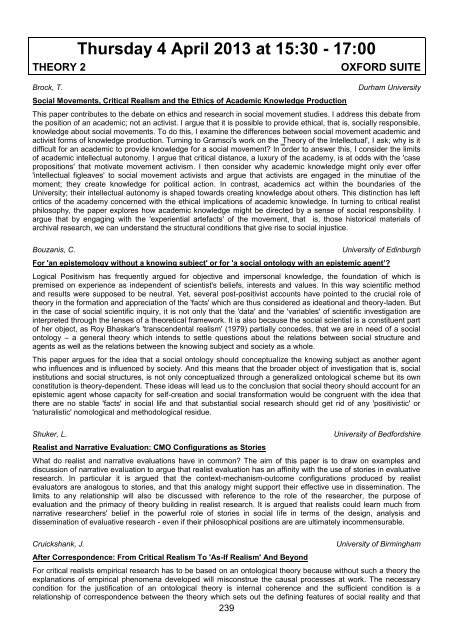Engaging Sociology
Engaging Sociology
Engaging Sociology
Create successful ePaper yourself
Turn your PDF publications into a flip-book with our unique Google optimized e-Paper software.
Thursday 4 April 2013 at 15:30 - 17:00<br />
THEORY 2 OXFORD SUITE<br />
Brock, T. Durham University<br />
Social Movements, Critical Realism and the Ethics of Academic Knowledge Production<br />
This paper contributes to the debate on ethics and research in social movement studies. I address this debate from<br />
the position of an academic; not an activist. I argue that it is possible to provide ethical, that is, socially responsible,<br />
knowledge about social movements. To do this, I examine the differences between social movement academic and<br />
activist forms of knowledge production. Turning to Gramsci's work on the ‗Theory of the Intellectual', I ask; why is it<br />
difficult for an academic to provide knowledge for a social movement? In order to answer this, I consider the limits<br />
of academic intellectual autonomy. I argue that critical distance, a luxury of the academy, is at odds with the 'case<br />
propositions' that motivate movement activism. I then consider why academic knowledge might only ever offer<br />
'intellectual figleaves' to social movement activists and argue that activists are engaged in the minutiae of the<br />
moment; they create knowledge for political action. In contrast, academics act within the boundaries of the<br />
University; their intellectual autonomy is shaped towards creating knowledge about others. This distinction has left<br />
critics of the academy concerned with the ethical implications of academic knowledge. In turning to critical realist<br />
philosophy, the paper explores how academic knowledge might be directed by a sense of social responsibility. I<br />
argue that by engaging with the 'experiential artefacts' of the movement, that is, those historical materials of<br />
archival research, we can understand the structural conditions that give rise to social injustice.<br />
Bouzanis, C. University of Edinburgh<br />
For 'an epistemology without a knowing subject' or for 'a social ontology with an epistemic agent’?<br />
Logical Positivism has frequently argued for objective and impersonal knowledge, the foundation of which is<br />
premised on experience as independent of scientist's beliefs, interests and values. In this way scientific method<br />
and results were supposed to be neutral. Yet, several post-positivist accounts have pointed to the crucial role of<br />
theory in the formation and appreciation of the 'facts' which are thus considered as ideational and theory-laden. But<br />
in the case of social scientific inquiry, it is not only that the 'data' and the 'variables' of scientific investigation are<br />
interpreted through the lenses of a theoretical framework. It is also because the social scientist is a constituent part<br />
of her object, as Roy Bhaskar's 'transcendental realism' (1979) partially concedes, that we are in need of a social<br />
ontology – a general theory which intends to settle questions about the relations between social structure and<br />
agents as well as the relations between the knowing subject and society as a whole.<br />
This paper argues for the idea that a social ontology should conceptualize the knowing subject as another agent<br />
who influences and is influenced by society. And this means that the broader object of investigation that is, social<br />
institutions and social structures, is not only conceptualized through a generalized ontological scheme but its own<br />
constitution is theory-dependent. These ideas will lead us to the conclusion that social theory should account for an<br />
epistemic agent whose capacity for self-creation and social transformation would be congruent with the idea that<br />
there are no stable 'facts' in social life and that substantial social research should get rid of any 'positivistic' or<br />
'naturalistic' nomological and methodological residue.<br />
Shuker, L. University of Bedfordshire<br />
Realist and Narrative Evaluation: CMO Configurations as Stories<br />
What do realist and narrative evaluations have in common? The aim of this paper is to draw on examples and<br />
discussion of narrative evaluation to argue that realist evaluation has an affinity with the use of stories in evaluative<br />
research. In particular it is argued that the context-mechanism-outcome configurations produced by realist<br />
evaluators are analogous to stories, and that this analogy might support their effective use in dissemination. The<br />
limits to any relationship will also be discussed with reference to the role of the researcher, the purpose of<br />
evaluation and the primacy of theory building in realist research. It is argued that realists could learn much from<br />
narrative researchers' belief in the powerful role of stories in social life in terms of the design, analysis and<br />
dissemination of evaluative research - even if their philosophical positions are are ultimately incommensurable.<br />
Cruickshank, J. University of Birmingham<br />
After Correspondence: From Critical Realism To 'As-If Realism' And Beyond<br />
For critical realists empirical research has to be based on an ontological theory because without such a theory the<br />
explanations of empirical phenomena developed will misconstrue the causal processes at work. The necessary<br />
condition for the justification of an ontological theory is internal coherence and the sufficient condition is a<br />
relationship of correspondence between the theory which sets out the defining features of social reality and that<br />
239


